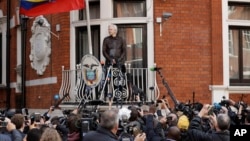WikiLeaks founder Julian Assange says he cannot “forgive or forget” what Sweden has put him through, following an announcement by Swedish prosecutors that they have dropped their rape case against him.
Assange has been living at the Ecuadorean Embassy in London since 2012 under virtual house arrest to avoid being detained in connection with the Swedish rape investigation, which began seven years ago. He said he has suffered a “terrible injustice,” without ever being charged with a crime.
Despite Friday's announcement in Sweden, the Australian-born former journalist and computer programmer remains at the Ecuadorean Embassy. British police say they will arrest him on a charge of jumping bail if he tries to leave. Assange also faces a possible sealed U.S. indictment against him.
Open to talking with U.S. officials
Speaking to reporters from the embassy's balcony, Assange said his legal team would reach out to British authorities. He added that he would be happy to discuss his situation with U.S. Justice Department officials.
Ecuador's foreign minister, Guillaume Long, said Britain should now grant Assange “safe passage,” and repeated his government's offer of asylum to the Australian whistle-blower.
Swedish authorities announced Chief Prosecutor Marianne Ny decided to “discontinue” the long-running investigation of suspected rape, while saying she was unable to judge whether Assange was guilty or not. The case can be reopened if Assange comes to Sweden, she added.
Assange has always claimed the charges against him were politically motivated.
Watching Assange since 2010
The U.S. Justice Department has been investigating Assange since at least 2010, when WikiLeaks published thousands of stolen U.S. security files.
Last month, CIA Director Mike Pompeo said in a speech in Washington that WikiLeaks directed a U.S. Army intelligence analyst to intercept “specific secret information” that “overwhelmingly focuses on the United States.”
U.S. intelligence agencies also contend Russia used WikiLeaks to publish emails by former presidential candidate Hillary Clinton during last year's U.S. presidential election.






